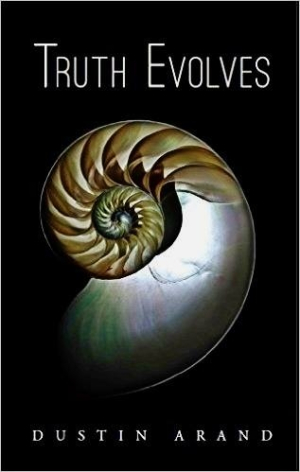Truth Evolves
This challenging and enlightening work argues that truth should be adaptable and examines how humans arrive at “truths” over time.
In Truth Evolves, Dustin Arand displays finesse with handling dense topics, and his work offers enlightenment for those pondering how humanity arrived at the notions it now accepts as truths.
This book is elegant from the first, with a provocative title and a lovely cover image of the cross section of a shell’s whorl, both of which capture the intriguing idea that “truths,” as we know them today, evolved over time and within circumstance—as is appropriate, argues the book. After all, scientists and philosophers once thought that the earth was at the center of the universe, and such “truths” had to change over time, as keener technology and advancements in thinking shifted.
The book delves into the realms of psychology and philosophy, with the initial introduction of two fundamental concepts upon which the book is based: ontogeny, the developmental history of an organism within its own lifetime, and phylogeny, the evolutionary development and diversification of a species or group of organisms. Understanding these terms, as well as terms like epistemology and heuristics, is essential. A good understanding of these concepts helps in following the thought process throughout the book, which is a well-guided and thought-provoking journey. It points out that people infrequently step back to question how and why they think the way that they do. The book offers a fascinating peek into how the brain organizes sensory data and garners meaning from the vast array of data that is constantly entering it.
The text touches upon a number of topics—everything from why humans tend to believe in supernatural beings to why babies as young as a few months old are surprised when what they see deviates from rules they’ve already internalized. It also sheds light on concepts like self and beauty. “Truth” looms over all of these explorations, as the need to solve problems is shown to be what drives the search for truth. Most illuminating is Arand’s argument that truth is not a set thing, changeless and static. Rather, he says, truth should be adaptable. This notion is encapsulated as “corrigibility,” the openness to reexamine, add to, and adjust understandings of what constitutes truth.
The writing is accessible, despite occasionally dense concepts. Arand uses approachable analogies to explain and emphasize his points, and his deft handling of topics stands to impress laypeople and academics alike. Fundamental ideas are repeated and summarized throughout, which is helpful for grasping the book’s sometimes lofty and abstract notions. The thin, faint rendering of chapter subheads proves to be the text’s most consistent challenge, as they are sometimes hard to read.
Looking for a challenging, enlightening, engaging, and thought-provoking read? All of those qualities are contained within the covers of Dustin Arand’s captivating Truth Evolves—and that’s the truth.
Reviewed by
Felicia Topp
Disclosure: This article is not an endorsement, but a review. The publisher of this book provided free copies of the book and paid a small fee to have their book reviewed by a professional reviewer. Foreword Reviews and Clarion Reviews make no guarantee that the publisher will receive a positive review. Foreword Magazine, Inc. is disclosing this in accordance with the Federal Trade Commission’s 16 CFR, Part 255.

